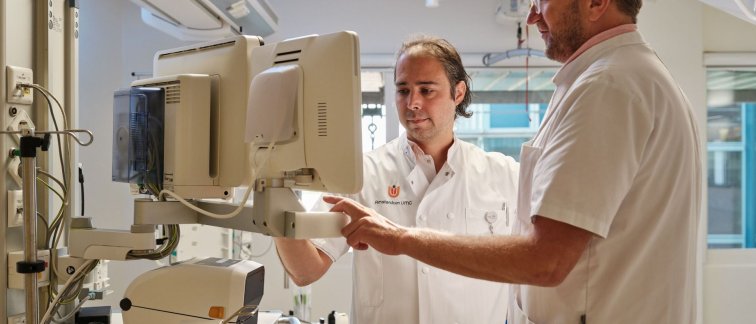What is the right time to transfer a patient from the Intensive Care Unit to the nursing ward? For this decision, doctors at the Intensive Care Unit of Amsterdam UMC are now supported by artificial intelligence, based on large amounts of information from electronic patient records. This allows intensive care treatments to be deployed as optimally as possible: a worldwide first!
Patient discharge is a daily-made decision in every Intensive Care Unit (ICU): is a patient ready to go to a nursing unit or not? Too soon is risky, if the patient deteriorates and has to go back to the ICU, the risk of death is higher. On the other hand, staying in the ICU for too long is also not a good idea. "That is above all unpleasant for the patient. But also very expensive and the bed cannot be used for another patient who may need it much more," says Paul Elbers, intensivist at Amsterdam UMC. "All very undesirable with the relatively low number of ICU beds in the Netherlands, a lack of ICU nurses and high absenteeism since corona." Especially with a possible new wave of the covid-19 pandemic this fall, optimal use of ICU capacity is essential.
Intensivist remains ultimately responsible
Elbers and fellow intensivist Patrick Thoral invented the software, called Pacmed Critical, together with the Amsterdam-based software developer Pacmed. The software works as follows: based on artificial intelligence (AI), real-time information from patients in the ICU is compared with information from thousands of patients who have been treated in an ICU in the past. At any given time, the software predicts how likely it is that a patient will need to return to the ICU within a week after being discharged to a nursing unit. The Pacmed Critical software not only shows the prediction, but also how that prediction changes over time and a list of factors upon which the prediction is based. The intensivist makes the final decision and is therefore ultimately responsible. Thoral: "We see it as a kind of second opinion. And by examining how the software is used in practice, we want to further increase the value for patients and caregivers."
Preventing readmissions
To develop the Pacmed discharge software, the developers used pseudonymized patient data from nearly 25,000 people who had recently been treated in the ICU at Amsterdam UMC. The goal of the software is to reduce the number of readmissions, but also to avoid treating patients in the Intensive Care unit for an unnecessary long time. Currently the number of readmissions in Dutch ICUs is around 5 to 10 percent. Thoral: "Our assumption is that there are benefits to be gained particularly from unplanned admissions, such as sepsis, pneumonia and a covid-19 infection. With these types of admissions, the likelihood of readmission is usually higher than with ICU admissions for planned care."
Global first
According to the intensivists, the discharge software is a global first. Thoral: "As far as I know, it is the only medical decision support software based on AI that is used in a hospital in this way. By this I mean the only decision support system at the bedside of the ICU patient, where algorithms and developed models are fed directly and in real time with data from the electronic patient record." Wouter Kroese, co-founder of Pacmed: "It is a huge milestone. It is incredibly important that AI is finally making the step into medical practice. This must be done responsibly and safely. Together with Amsterdam UMC, we have taken all the necessary steps for this. And we comply with all regulations to be able to use the software as a medical device. We are ready to scale up and expand the software so that it can help solve capacity and staffing challenges in hospitals throughout the Netherlands and beyond."
Amsterdam coalition: AI Technology for People
Together with the City of Amsterdam, research and medical centers, universities and knowledge institutions, Amsterdam UMC is committed to making the Amsterdam region a leader in the knowledge and development of AI technologies. This Amsterdam coalition, under the flag AI Technology for People, will invest 1 billion euros over the next 10 years in pioneering research programs, attracting top talent, and developing and supporting startups and spin-offs.
Source: photo by Maarten Willemstein

